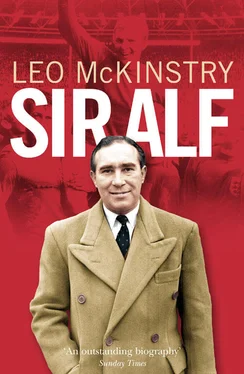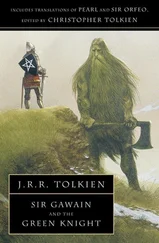1 ...8 9 10 12 13 14 ...28 The same story can be told when he went to Tottenham Hotspur, where again he was no loud-mouth shouting the odds in a broad vernacular. ‘He sounded as if he came from the country. He spoke very slowly with a rural twinge in his accent, a sort of country brogue. It was the same as you would find in people from Norwich, a burr,’ remembers Denis Uphill. Equally revealing is the memory of Ed Speight, who himself was born in Dagenham and joined Tottenham in 1954: ‘He was a gentleman. He always spoke very quietly; rarely did I hear him swear. When he spoke, the top lip did not move. It was all from the lower mouth. Very clipped, staccato stuff.’ Tony Marchi, who was another young player at Spurs in the early fifties, goes so far as to say that, in his memory, ‘Alf had much the same voice when he was at Spurs as when he became England manager. It never really altered.’
The reality was that, by the early fifties, Ramsey was already beginning to demonstrate those concise, somewhat convoluted tones which were to become so much a part of his public character. Through listening to the radio and reading improving texts, he sought to acquire a more refined voice. In 1952, when he was still at Spurs, he had written about his lifestyle in Talking Football:
In the evening I usually have a long read for, like Billy Wright, I have found that serious reading has helped me develop a command of words so essential when you suddenly find yourself called upon to make a speech. People, remember, are inclined to forget that speechmaking may not be your strong point. With this in mind, I always try hard to put up some sort of show when asked to say a few words.
Even the keenest advocate of the Victorian philosophy of self-help could not have put it better. And by the time he reached Ipswich in 1955, his voice only required a more few coats of varnish, not an entire rebuild. It seems likely that the varnish was provided, not by elocution lessons, but by more self-improvement allied to his connection to the most aristocratic boardroom in the country, whose number included a baronet and a nephew of the Tory Prime Minister.
Though some did not believe him, Alf was always adamant that he had not undergone any course in elocution. He stated in that Mirror article of 1970:
I must emphasize that I am not a cockney. I make the point because I have been accused of taking elocution lessons. And told that it is to my credit that I had taken them. The truth is that I have not had elocution lessons. I wish I had. They might have been a help to me. All this business, however, is not important to me. I’ve nothing to be ashamed of. I’m proud of my family, my parents and of all that has happened to me in my life.
As Alf indirectly admitted there, if he had really taken such lessons, it is improbable that he would have found communication so difficult. Nigel Clarke says:
I once pulled his leg about the rumour of his so-called elocution lessons, and he bristled and said, ‘That is absolutely not true.’ He then explained that he used to listen to the BBC radio announcers and modulated his tones to match theirs. I am sure that is true. I mean Alf would not even have known what the word elocution meant.
A local government study of Dagenham in 1938 described the local population thus:
Many are rough diamonds, but still diamonds. There is a general readiness to help each other when in trouble, a readiness to support various causes (but only after protracted and heated argument), an appreciation of good music, the usual fondness for Picture Palaces and an undue attachment to the Dance hall.
Eighteen-year-old Alf Ramsey could not easily have been described as a Dagenham ‘rough diamond’. He showed no interest in dancing, was shy with women despite his dark good looks, had few musical tastes and avoided arguments except when they involved football. He had, however, developed an enthusiasm for the movies, one that was to stay with him all his life and would cause much amusement to the players under his management. He saw his first film when he was fourteen, a jungle adventure with Amercian B-movie star Jack Holt in the leading role. Alf soon had acquired a particular fondness for westerns, which so often revolved around the theme of a tight-lipped heroic outsider triumphing over the natives, the bad guys or the corrupt authorities.
But his first love remained football. During the 1937-38 season, he was playing better than ever at centre-half with Five Elms United, as he recorded himself: ‘Since leaving school I had developed into quite a hefty lad, and in my heart I knew I had improved my football.’ His exploits in the Five Elms defence brought him to the attention of Portsmouth, one of the country’s senior League clubs. He and two other Five Elms players were approached by experienced scout Ned Liddell, who was for a time manager of Brentford, and asked if they might be interested in signing for Portsmouth as amateurs. Before this, claimed Alf, the thought of becoming a League player ‘had never entered my mind. After all, I was too modest to think I was anything much as a footballer. I just played the game for fun and the exercise that went with it.’
For a young man obsessed with the game, the chance to play at the highest level was a glittering prospect. But he hesitated for a moment. Apart from some natural uncertainty about his ability, Alf was also worried about the financial insecurity of life in League football. After all, hundreds of youths were taken on every year by the 88 League clubs but very few of them made a decent living. Alf already had a secure job in the Co-op store in Oxlow Lane near his home; by 1938 he had graduated from delivery boy to counter hand and bill collector, the latter a role which required a certain amount of toughness. ‘Going out to collect the bills occupied Monday morning as far as I was concerned. There were no embarrassing moments when collecting money. People either paid or they didn’t, but in the main they paid.’
But when Alf met Ned Liddell again, he was assured that there would be no problem about keeping his Co-op job if he signed as an amateur. Moreover, Alf’s family were not opposed to the idea. ‘Well, son, it’s up to you,’ said his mother. So Alf, now relishing the thought of joining a top club, filled in the forms and sent them off to Fratton Park, Portsmouth’s ground. He waited eagerly for a reply. None came: not a letter, a card, a telegram, a word from Ned Liddell. The weeks passed in silence until Alf gave up hope. ‘No one, it seemed, was interested in young Ramsey of Dagenham,’ he wrote later.
Portsmouth’s gross discourtesy was a seminal experience for Alf. It left him with a profound distrust of the men running football, the club directors and officials who treated players with such haughty contempt and undermined careers with barely a thought. He came to share the view of Harry Storer, the hard-nosed Derby County manager who once questioned the right of a certain director to be an FA selector. Having been told that this director had been watching the game for 50 years, Storer replied: ‘We’ve got a corner flag at the Baseball Ground. It’s been there for 50 years and still knows nothing about the game.’ As Stanley Matthews, who suffered from the administrators’ arrogance as much as anyone, ruefully commented: ‘Players were treated as second-class citizens. Football was a skill of the working class but those who ran our game were anything but.’ Portsmouth’s rudeness ensured that Alf, when he became a manager, never acted in such a cavalier manner; his concern for the well-being of professionals was one of the reasons he always inspired such loyalty.
Ignored by Portsmouth, Alf carried on working at the Oxlow Lane Co-op for the next two years, playing football in the winter, cricket in the summer. Nigel Clarke recalls:
Читать дальше












